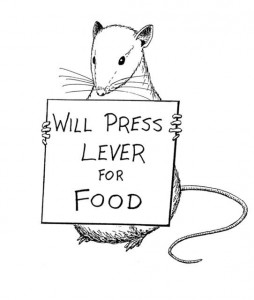Blog Post 6
Third Force Psychology is called by many names, but most call it Humanistic Psychology. Regardless of the label attached to it, Third Force Psychology focuses on self actualization and creativity of individuals. One of the main cornerstones of third force psych is that humans are naturally good and any action, thought, or emotion that is not good is just a deviation from the natural human tendency to do good. I would like to compare and contrast 2 entities that embody third force beliefs, or the opposite.
A modern example of someone who supports third force thoughts and beliefs is Barack Obama. To be more specific, Barack Obama supports third force psychology in his campaigns. I don’t intend to turn this blog post into a political argument so lets focus on some of the simple things that everyone can agree on. Many articles and people label Barack Obama as “The Man of Many Slogans” because his campaign slogans that accompanied him in 2008 and 2012. All of these slogans follow the belief that all humans are inherently good and will continue to do good naturally. Obama’s campaign slogans encourage people everywhere, regardless or status, to keep being good. “Believe” was a slogan in 2008, encouraging us to believe in the good of others and the good of Obama to lead the country. “Yes We Can” was another 2008 slogan that helped us believe that with the good in people and hard work, we can do anything. Finally in 2012 he debuted with “Forward!” This is a reference to the good in people helping themselves and others move forward in a world that seems to be moving backwards.
As a contrast, the media seems to always point out the bad in people. You never hear stories about people saving others or doing good deeds but instead you hear stories of disasters and people committing crime and acts of terrorism. The media is a good example of a group that refutes third force psychology.
Thoughts?


Gavin Lane on Raymond Lowe - Blog #6
10:03 pm, 04.24.13
I think it is a good point that you mentioned that America seems to embody third force psychology. The view that everyone has good in them and that everyone should work hard and be creative are really the cornerstones of the american dream!
Gavin Lane on Third Force Psychology
9:48 pm, 04.24.13
I too was raised by parents with similar views that you should always be creative, do your best, and there is good in every person. I think it is interesting that this view seems to be shared by different cultures. The southern culture seems to share this view as well as the military culture, and my dad was a part of both. It is cool to see that psychology is the source of all of this.
Gavin Lane on Blog 4: Behaviorism
9:25 pm, 04.03.13
I like this example a lot because I have always doubted how this conditioning technique could be applied to humans. Sure, Pavlov can train a dog but a dog has a brain the size of a peanut and is an incredibly simple animal. This proves to me that humans can be “trained” and maybe we are simple animals too! Interesting!!
Gavin Lane on Behaviorism
9:23 pm, 04.03.13
Jason,
I liked when you mentioned that conditioning has been used on us in the past. I believe this is right on point. You see many examples of this in school especially. If you get a question right you get a candy, for good behavior you get a gold star. It seems like we were destined to be conditioned from the beginning!
Gavin Lane on Blog three evolutionary psychology
7:08 pm, 03.06.13
I like the fact that you pointed out our conserative background here at Abilene Christian. What I am most proud of is the openmindedness that is beginning to become prevalent at ACU. 20 years ago ACU may have not taught evolutionary psychology because they were so against it but now through logic and reason we have discovered its merit and been able to work it into our Christian beliefs without compromising. Go ACU!
Gavin Lane on Raymond Lowe: Blog #3 - EP
7:05 pm, 03.06.13
I found some interesting information in the articles we read too. The article I read said that all moral things were driven by evolution. I was in agreement with the author when she talked about reciprocal altruism being advantageous and therefore evolutionary but when she tried to justify free will being evolutionary we disagreed. She said that a snail who chooses his sheel to attract a mate is exercising free will in his choice. To me that seems like instincts. Good tie in to the article Raymond!
Gavin Lane on Blog post 2
9:30 pm, 02.01.13
I think that this is a very interesting point. The Greek’s were searching for wealth, fame, and fortune and I agree that many people are still searching for that today. Isn’t this what the American dream has become? The American dream used to be coming to America and working your way to the top. But now the dream has become about being rich and famous. Therefore like you said above, people will go through incredible lengths to achieve this fame and fortune. Though this isnt the same as the Greek search for knowledge and answers, the root is the same
Gavin Lane on Blog 2
9:25 pm, 02.01.13
Tyler, I think your point about the “true intellectuals” searching for the truth is very good but sometimes it is hard to find in America today. I feel that many people will just take what life gives them and not work hard to question and search for what is really true. It is only at great educational places like ACU that we continue to search for truth and answers. Maybe society today could take some hints from Greek philosophy.